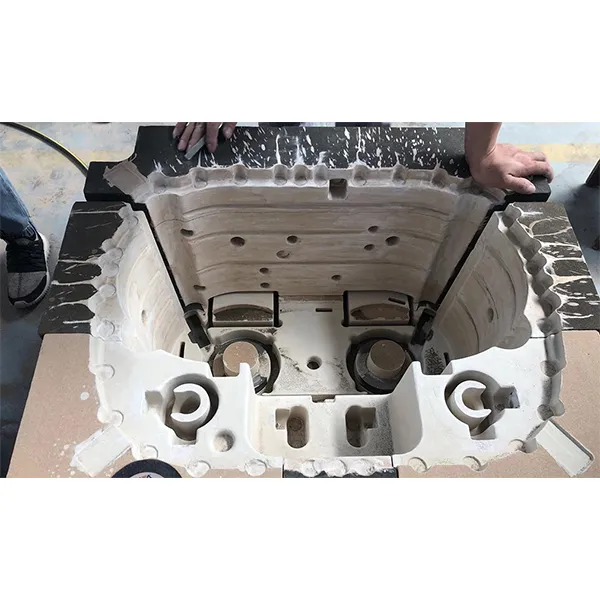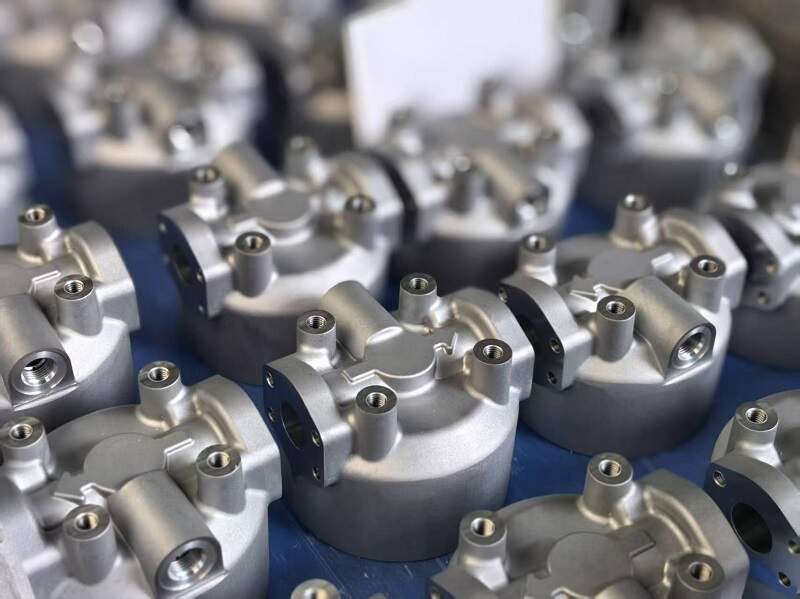Aluminum Foundry services that support your manufacturing output
Wiki Article
The Future of Light Weight Aluminum Foundries: Trends and Developments Shaping the Market
The aluminum shop industry is going through substantial makeover. Trick patterns highlight the value of sustainability and effectiveness. Advancements in smart production and automation are coming to be widespread. Shops are increasingly concentrated on making use of recycled products. This change increases inquiries concerning future techniques and innovations. How will these adjustments influence manufacturing approaches and market dynamics? The answers might redefine the market landscape in unanticipated ways.Advancements in Smart Manufacturing Technologies
As the aluminum foundry industry develops, improvements in smart production innovations are ending up being progressively important for improving performance and efficiency. The combination of automation, synthetic intelligence, and the Internet of Things (IoT) is changing standard shop operations. These modern technologies allow real-time monitoring of procedures, permitting instant modifications that enhance outcome and lower waste.Machine knowing algorithms analyze production information to identify patterns and forecast upkeep needs, minimizing downtime. Robotics are progressively employed for recurring tasks, freeing proficient employees to concentrate on even more intricate obstacles. In addition, electronic twins-- virtual models of physical processes-- promote simulations that can enhance layout and operational approaches.
The adoption of these clever production modern technologies is driving competitive benefits in the aluminum foundry field. By streamlining process and improving decision-making capabilities, foundries can satisfy expanding market needs while keeping top notch requirements. The future of aluminum foundries is unquestionably linked to these technical developments.
Embracing Eco-Friendly Products and Processes
The aluminum foundry market is significantly concentrating on green products and processes to improve sustainability. This shift includes the fostering of sustainable material sourcing, energy-efficient production methods, and effective recycling and waste management methods. By integrating these practices, shops intend to minimize their environmental effect while keeping competitiveness in the marketplace.Lasting Material Sourcing
Just how can light weight aluminum factories enhance their sustainability efforts? Lasting product sourcing has arised as an essential technique in accomplishing this objective. By prioritizing recycled light weight aluminum, foundries can significantly reduce their environmental impact, as recycled materials require less power and less sources compared to primary light weight aluminum production. On top of that, sourcing products from certified providers who follow environment-friendly techniques promotes responsible mining and decreases ecological impact. Factories are likewise exploring alternative materials, such as biopolymers and green finishes, to match traditional aluminum processes. Collaborating with stakeholders, including vendors and environmental companies, cultivates advancement in sourcing approaches. Eventually, accepting sustainable product sourcing not only straightens with global sustainability goals but likewise placements light weight aluminum foundries as leaders in eco liable production.Energy-Efficient Production Strategies
Aluminum factories are increasingly embracing energy-efficient manufacturing techniques to enhance their sustainable product sourcing initiatives. These methods concentrate on minimizing power intake throughout the production process. Advanced innovations, such as induction melting and maximized casting procedures, are being applied to minimize the overall carbon footprint. Additionally, automation and clever manufacturing systems boost functional performance, enabling better power administration. Factories are additionally exploring the assimilation of renewable power resources, such as solar and wind, to power their procedures. By focusing on energy performance, aluminum factories not only lower manufacturing prices yet additionally straighten themselves with global sustainability objectives, ensuring a much more eco accountable strategy to aluminum production while fulfilling the climbing need for green practices in the industry.Recycling and Waste Management
Embracing eco-friendly materials and processes, aluminum foundries are prioritizing recycling and waste management methods to improve sustainability in their procedures. By incorporating closed-loop systems, these facilities are decreasing waste and taking full advantage of source efficiency. Scrap light weight aluminum, an easily available material, is being reused on-site, substantially decreasing the requirement for virgin materials and lowering power intake. Advancements in sorting and processing modern technologies further assist in the recycling of light weight aluminum, making certain that even polluted materials can be repurposed efficiently. In addition, foundries are embracing sustainable methods such as decreasing contaminated materials and advertising the usage of naturally degradable materials for product packaging. This commitment to reusing not only reduces ecological impact but also enhances the economic feasibility of aluminum factories in a competitive market.The Function of Automation and Robotics
Automation and robotics are increasingly transforming the light weight aluminum shop industry, significantly boosting production performance. By incorporating advanced modern technologies, foundries can minimize labor prices while concurrently improving safety criteria for their workforce. This shift not only streamlines procedures yet also places the market for sustainable growth in an open market.Boosted Production Performance
Changing manufacturing procedures, the assimilation of advanced robotics and automation technologies has actually come to be a keystone for aluminum factories looking for enhanced effectiveness. These innovations improve operations, decrease cycle times, and boost item top quality by lessening human mistake. Automated systems can keep track of manufacturing lines in real-time, enabling instant changes that enhance output. On top of that, robotics help with the handling of harmful products, making sure much safer working atmospheres while increasing throughput. Anticipating maintenance modern technologies additionally add to efficiency by expecting tools failings, therefore decreasing downtime. Therefore, light weight aluminum foundries can accomplish greater consistency in their products while responding much more quickly to market needs. This embrace of automation is establishing a brand-new standard for performance and operational excellence within the industry.
Reducing Labor Prices
The change towards progressed robotics and automation in light weight aluminum shops not only improves manufacturing effectiveness but likewise plays a considerable duty in minimizing labor prices. By integrating automated systems, foundries can decrease the dependence on hand-operated labor, which typically includes high incomes and training expenses. Robotics enhance repeated tasks such as putting, molding, and finishing, enabling a greater outcome with less personnel. This technical adjustment not only minimizes labor-related prices yet likewise enhances article uniformity and high quality in production. Automation can run around the clock, making best use of functional hours without the connected expenses of overtime or shift differentials. Consequently, aluminum shops can attain significant cost savings while preserving affordable prices in a developing market landscape.Improving Safety And Security Requirements
While standard aluminum factory procedures frequently expose workers to harmful settings, the integration of robotics and automation considerably boosts safety and security standards within the market. Automated systems can do risky jobs, such as liquified steel handling and hefty training, minimizing human direct exposure to unsafe problems. Furthermore, robotics can operate in toxic environments and severe temperatures, efficiently minimizing the risk of injury. Advanced keeping track of innovations and expert system assurance real-time security analyses, permitting prompt feedbacks to possible hazards. Furthermore, automation enhances process, reducing the likelihood of accidents brought on by human mistake. Therefore, the adoption of these technologies not only enhances safety yet additionally fosters a more productive and efficient functioning environment in light weight aluminum shops.Enhancing Energy Efficiency in Production
As light weight aluminum shops look for to preserve competition in an advancing market, improving power effectiveness in manufacturing has emerged as an essential emphasis. By embracing advanced technologies such as high-efficiency melting heating systems and automated temperature level controls, factories can notably reduce energy consumption. Applying real-time monitoring systems permits accurate monitoring of energy usage throughout the manufacturing procedure, enabling fast modifications to maximize performance.Additionally, changing to alternate energy sources, consisting of eco-friendly choices, can better reduce the carbon footprint. The assimilation of energy healing systems, which recover waste heat for reuse, is coming to be progressively usual. Educating employees in energy monitoring methods assures that every person involved in the production procedure is conscious of power use.
These initiatives not just lower functional costs yet also straighten with international sustainability goals, positioning light weight aluminum factories as accountable players in the sector while improving their overall competition. - aluminum casting
Innovations in Recycling Light Weight Aluminum
Developments in recycling light weight aluminum have obtained momentum alongside initiatives to boost energy efficiency in manufacturing. The light weight aluminum industry has actually welcomed advanced modern technologies that enhance the recycling process, decreasing power intake and environmental influence. Strategies such as hydrometallurgy and new sorting technologies enhance the extraction of light weight aluminum from scrap, improving yield prices and making certain greater high quality recycled material.
The advancement of closed-loop recycling systems enables foundries to reuse light weight aluminum without significant destruction in top quality, making the procedure extra lasting. Advancements in logistics and collection, consisting of improved monitoring systems and automated sorting, have actually also played an important function in boosting the effectiveness of light weight aluminum recovery. These innovations not only add to a circular economy however likewise assist mitigate the carbon footprint related to aluminum production. As the need for sustainable practices grows, these technologies position the aluminum shop market as a leader in accountable resource administration.
Reacting To Market Needs and Customer Trends
Flexibility has actually ended up being a keystone for aluminum foundries reacting to advancing market demands and customer patterns. As markets significantly focus on sustainability, aluminum shops are shifting in the direction of green practices, consisting of boosted recycling procedures and decreased carbon footprints. This shift straightens with consumer choices for ecologically responsible products, driving factories to innovate their offerings.Furthermore, the surge of lightweight products in vehicle and aerospace sectors requires improvements in light weight aluminum alloys and casting techniques. Factories are investing in research study and development to generate high-strength, lightweight components that fulfill rigorous efficiency standards.
Customization has obtained traction, with consumers seeking tailored services. Aluminum shops are leveraging advanced manufacturing innovations, such as 3D printing, to accommodate certain customer requirements successfully. This responsiveness not just pleases customer needs but additionally positions aluminum foundries competitively in a vibrant market landscape, guaranteeing their importance in an ever-changing industrial setting.

Often Asked Questions
How Do Light Weight Aluminum Foundries Influence Resident Economies?
Aluminum foundries substantially affect neighborhood economic climates by creating tasks, boosting demand for regional vendors, and adding to community advancement. Their procedures often bring about increased tax profits, which can money important civil services and facilities enhancements.What Are the Safety And Security Laws for Light Weight Aluminum Factory Workers?
Safety visit this website and security guidelines for light weight aluminum foundry workers consist of obligatory personal safety equipment, proper ventilation systems, regular training on dangerous materials, and adherence to standards established by job-related health and security administrations to decrease dangers and assurance worker security. - Aluminum FoundryHow Does Light Weight Aluminum Recycling Affect Global Supply Chains?
Aluminum reusing considerably lowers need for basic materials, enhances source effectiveness, and supports prices. This shift influences worldwide supply chains by promoting a circular economic situation, promoting sustainability, and making sure an extra durable industry in changing markets.What Profession Opportunities Exist in the Light Weight Aluminum Factory Sector?
Various profession possibilities exist in the light weight aluminum shop market, including duties in engineering, quality assurance, manufacturing management, and research study and advancement. Knowledgeable labor positions such as mold manufacturers and equipment drivers are likewise in demand.Just How Do International Profession Plans Influence Light Weight Aluminum Foundries?
International profession policies substantially influence aluminum shops by influencing import tolls, supply recommended you read chain characteristics, and market access. These elements can affect functional prices, competition, and general profitability within the worldwide aluminum production landscape.By focusing on recycled aluminum, factories can considerably reduce their environmental footprint, as recycled materials require less energy and fewer sources compared to main light weight aluminum manufacturing. Light weight aluminum factories are increasingly adopting energy-efficient manufacturing techniques to match their sustainable product sourcing initiatives. Automation and robotics are progressively transforming the light weight aluminum factory market, substantially enhancing production performance. The shift in the direction of advanced robotics and automation in aluminum foundries not just enhances manufacturing effectiveness however additionally plays a considerable role in reducing labor prices. As light weight aluminum factories seek to maintain competitiveness in an evolving market, boosting power efficiency in manufacturing has actually arised as an essential focus.
Report this wiki page